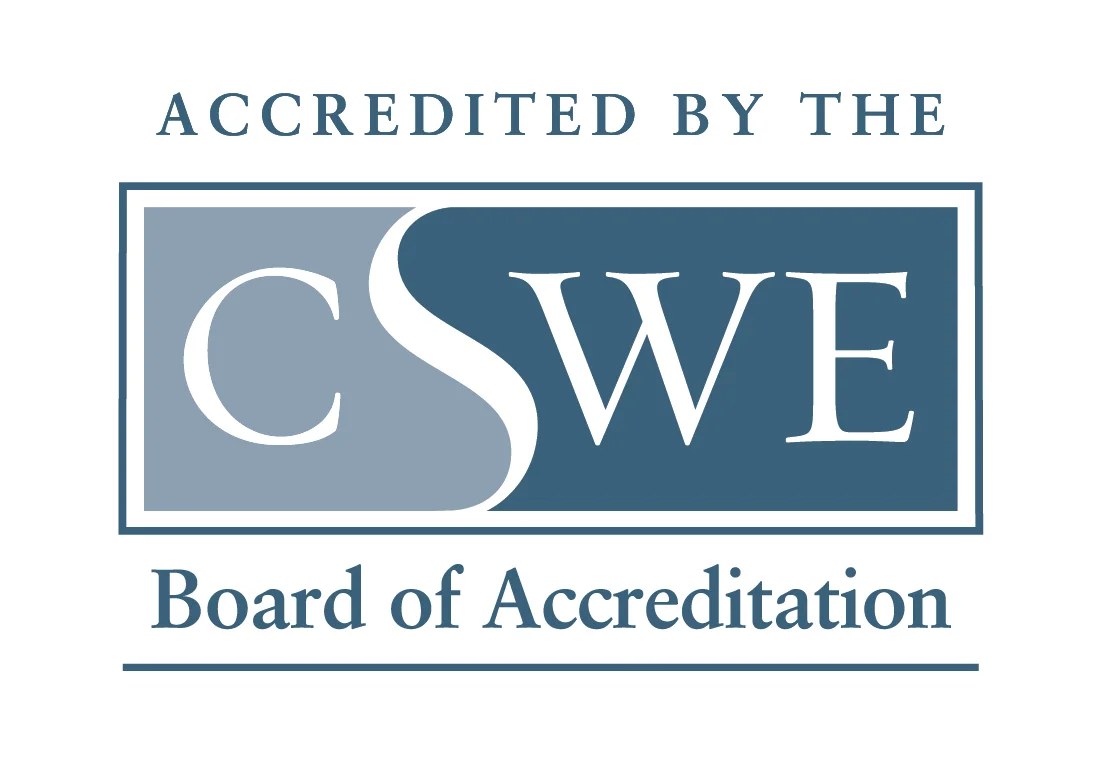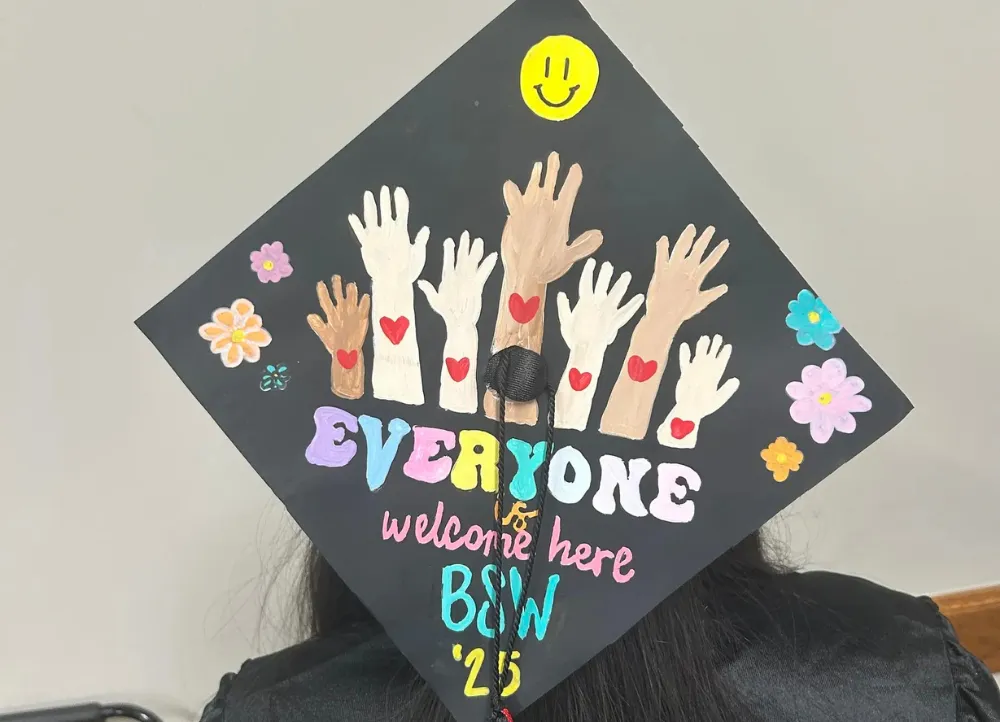Social Work

Supporting those in need
Get ready to find a rewarding career helping those in need around your communities. Come check out what a Bachelor's degree in Social Work can do for you.
We also offer a Minor in Children's Advocacy Studies. If you wish to add this minor, please speak with your advisor.
If you are ready to take your social work career even further, come look at our Master's in Social Work. With advanced knowledge, you'll prepare for industry certifications and how to provide even more care and support.
We also offer a Graduate Certificate in Addiction Studies. Find out what courses you need to add this advanced certificate.
ACCREDITED BY CSWE
The B.S. and M.S. in Social Work programs are accredited by the Council on Social Work Education’s Board of Accreditation.
Accreditation of a baccalaureate or master’s social work program by the Council on
Social Work Education’s Board of Accreditation indicates that it meets or exceeds
criteria for the assessment of program quality evaluated through a peer review process.
An accredited program has sufficient resources to meet its mission and goals and the
Board of Accreditation has verified that it demonstrates compliance with all sections
of the Educational Policy and Accreditation Standards.
Accreditation applies to all program sites and program delivery methods of an accredited
program. Accreditation provides reasonable assurance about the quality of the program
and the competence of students graduating from the program.

Connect With Us.
Program Data & Information
- The application deadline is the second Friday of February.
- Students will submit completed applications to the Pre-Major Advisor/Social Work (SW) Department Secretary by due date along with a copy of their current transcript. Applications must be turned in to above designated personnel in the Social Work Department during scheduled office hours.
- The SW Personnel will verify students’ eligibility to apply. Also, students must have completed Introduction to Social Work, ENG 1003 English Composition I and ENG 1013 English Composition II, PSY 2513 Introduction to Psychology, BIOL 1003/1001 Biological Science and Biological Lab, SOC 2213 Introduction to Sociology, & POSC 2103 Introduction to US Government and with a “C” or higher.
- The SW personnel will verify application package and log student name. The completed application package will be submitted to the Admissions Committee Chair in one week: Third Monday in February.
- Student must certify that they will comply with the
- NASW Code of Ethics
- College Substance Abuse Policy.
- Release of information and disclosure form.
- Photo/Video Consent Form.
- College Student Code of Honor Form.
- The admissions committee will convene to review applications and make recommendations.
- The Director of the BSW Program will notify all applicants of their conditional acceptance into the social work program status in writing by April. All applicants will remain conditionally admitted until clearing a background check.
- Based on recent legislation in Arkansas, students admitted to professional programs that require licensure in a state upon graduation are required to have a successful background check to complete formal admissions. This cost is the responsibility the student.
- The newly admitted BSW students must attend the Orientation Meeting. Check with the
Director of the BSW Program the date for this event.
For questions regarding admissions process, please call BSW Director Dr. Rashele Wade at 870-680-8296.
Admission to the BSW Program is competitive. To be considered for admission to the BSW Program, students must meet the minimum requirements of the program that are in effect at the time they seek admission. Meeting the minimum requirements for admission consideration to the BSW program does not necessarily guarantee acceptance to the program.
Students seeking admission into the BSW program must submit a complete application packet, which includes:
- Three professional letters of recommendation, one of which must be from the student’s Introduction of Social Work Professor or Instructor. The forms for all letters of references will be included in admission package.
- Application form, personal interest statement, and transcripts.
- Student must certify that they will comply with the NASW Code of Ethics and the College Substance Abuse Policy.
Prerequisites
After admission to the University, any student may declare social work as a major. All students declaring social work as their major will receive pre-admission advising from a social work faculty member. Admission to the BSW Program is competitive. To be admitted to the BSW Program, students must meet the requirements of the program that are in effect at the time they seek admission.
Current Admission Criteria
- Should have completed a minimum of 45 semester hours of course work at a college/university. Students who have not completed 45 semester hours of course work at a college/university will be considered for conditional admission on a case-by-case basis.
- Have an overall GPA of 2.75 at the time of admission. Maintain a minimum GPA of 2.75 overall and a 2.75 in the major. Overall GPA is defined as all coursework that is being used to satisfy requirements for the BSW degree regardless of the institution from which the credits were earned.
- Must have completed required prerequisite coursework. Prerequisite requirements can be found in the most current Undergraduate Bulletin.
Goals & Objectives
The BSW Program at A-State has four goals. Each of these goals consists of guiding principles for curriculum development and support program activities.
Goal 1: To prepare graduates for practice with individuals, families, groups, organizations, and communities.
Objective 1: Apply critical thinking skills within the context of generalist social work practice.
Objective 2: Demonstrate the professional use of self.
Objective 3: Apply the knowledge and skills of a generalist social work practice with systems of all sizes (individual, family, group, organization, and community).
Objective 4: Apply the knowledge of biological, psychological, sociological, and spiritual factors that affect the individual development and behavior, and use theoretical frameworks to understand the interactions between individuals as well as between individuals and various social systems.
Objective 5: Use communication skills differentially with a variety of client populations, colleagues, and members of the community.
Goal 2: Graduates will apply knowledge pertaining to the contexts of social work practice, the changing nature of those contexts, the behavior of organizations, the dynamics of change, and develop the skills necessary to become change agents.
Objective 1: Understand and interpret the history of the social work profession as well as its contemporary structures and issues.
Objective 2: Formulate, influence, and analyze the impact of social policies on client systems, workers, agencies, and communities.
Objective 3: Function within the structure of organizations and service delivery systems and seek organizational change when necessary.
Objective 4: Understand the value base of the profession and its ethical standards and principles, and practice accordingly.
Objective 5: Apply planned changed process in or among social work practice levels.
Goal 3: To infuse throughout the curriculum the values and ethics that guide professional social workers in their practice.
Objective 1: Understand the forms and mechanisms of oppression and discrimination and the strategies of advocacy and social change that advance social and economic justice.
Objective 2: Practice within the value and ethics of the social work profession and with an understanding of and respect for the positive value of multiple dimensions of diversity, including age, class, color, culture, disability, ethnicity, family structure, gender, marital status, national origin, race, religion, sex, and sexual orientation.
Objective 3: Evaluate research studies and apply research findings to practice, and under supervision, to evaluate their own practice interventions and those of other relevant systems.
Goal 4: Graduates of the BSW Program will understand their responsibility to continue their
professional development.
Objective 1: Demonstrate the ability to plan for and implement appropriate lifelong professional development activities including maintaining appropriate professional credentials.
Objective 2: Demonstrate an ability to assess and incorporate new knowledge and skills for competent generalist practice.
Objective 3: Use supervision and consultation appropriate to generalist practice.
Core Values
The core values embraced by the A-State Social Work Department are the shared values
of the social work profession throughout history and are the foundation of this program
and social work’s unique
purpose and perspective. These six values are:
- Service
- Social justice
- Dignity and worth of the person
- Importance of human relationships
- Integrity
- Competence
Professional resources
The National Association of Social WorkersThe National Association of Social Workers (NASW) is “a membership organization that promotes, develops, and protects the practice of social work and social workers” (Arkansas, NASW, 2003). Students receive a special membership rate and have access to practice insurance while in school. All students are encouraged to join the NASW.
Visit the national NASW websiteNASW Code of Ethics
The NASW Code of Ethics guides all social workers in ethical practice.
VIEW THE NASW CODE OF ETHICS >>
Arkansas Social Work Licensing BoardLicensing information and continuing education requirements can be found on their website.
A-State is expected to achieve at least 85% on each level of competency.
Competency 1:
- Instrument 1: Reflection and Theoretical Analysis Paper: Case Study.
- Students must score a minimum of 3 out of 4 points.
- Instrument 2: Field Evaluation/Learning Agreement.
- Students must score a minimum of 4 out of 5 points on items 1.1 through 1.4.
Competency 2:
In order to remain in legal compliance with State of Arkansas Act 341 (Arkansas ACCESS Act), Arkansas State University is not to collect or report data related to DEI for accreditation purposes.
Competency 3:
In order to remain in legal compliance with State of Arkansas Act 341 (Arkansas ACCESS Act), Arkansas State University is not to collect or report data related to DEI for accreditation purposes.
Competency 4:
- Instrument 1: Organization Research Paper.
- Students must score 3 out of 4 points.
- Instrument 2: Field Evaluation/Learning Agreement.
- Students must score a minimum of 4 out of 5 points on Items 4.1 & 4.2.
Competency 5:
In order to remain in legal compliance with State of Arkansas Act 341 (Arkansas ACCESS Act), Arkansas State University is not to collect or report data related to DEI for accreditation purposes.
Competency 6:
- Instrument 1: Reflection and Theoretical Analysis Paper: Film.
- Students must score a minimum of 3 out of 4 points.
- Instrument 2: Field Evaluation/Learning Agreement.
- Students must score a minimum of 4 out of 5 points on items 6.1 & 6.2.
Competency 7:
- Instrument 1: Your Own Non-Profit Social Work Agency Project.
- Students must score a minimum of 3 out of 4 points.
- Instrument 2: Field Evaluation/Learning Agreement.
- Students must score a minimum of 4 out of 5 points on items 7.1 & 7.2.
Competency 8:
- Instrument 1: Individual Reflection and OBservations of Group Process.
- Students must score a minimum of 3 out of 4 points.
- Instrument 2: Field Evaluation/Learning Agreement.
- Students must score a minimum of 4 out of 5 points on items 8.1 & 8.2.
Competency 9:
- Instrument 1: Program Analysis Case Study Paper.
- Students must score a minimum of 3 out of 4 points.
- Instrument 2: Field Evaluation/Learning Agreement.
- Students must score a minimum of 4 out of 5 points on items 9.1 & 9.2.
BSW summary of outcomes
| Competency | Expected Level of Achievement | Aggregate Actual Outcomes for All Program Options (n=59) | Program Option 1 Outcomes |
|---|---|---|---|
| 1 | 85% | 93.5% | 93.5% |
| 2 | In order to remain in legal compliance with State of Arkansas Act 341 (Arkansas ACCESS Act), Arkansas State University is not to collect or report data related to DEI for accreditation purposes. | ||
| 3 | In order to remain in legal compliance with State of Arkansas Act 341 (Arkansas ACCESS Act), Arkansas State University is not to collect or report data related to DEI for accreditation purposes. | ||
| 4 | 85% | 92.5% | 92.5% |
| 5 | In order to remain in legal compliance with State of Arkansas Act 341 (Arkansas ACCESS Act), Arkansas State University is not to collect or report data related to DEI for accreditation purposes. New assessment data will be gathered as new instruments are assessed to remain in legal compliance. | ||
| 6 | 85% | 82.5% | 82.5% |
| 7 | 85% | 97% | 97% |
| 8 | 85% | 98.5% | 98.5% |
| 9 | 85% | 88.5% | 88.5% |
msw summary of outcomes
Generalist Practice
Competency 1:
- Instrument 1: Cultural Self-Inventory Paper
- Students must score a minimum of 3 out of 4 points.
- Instrument 2: Field Evaluation/Learning Agreement.
- Students must score a minimum of 4 out of 5 points on items 1.1 through 1.4.
Competency 2:
In order to remain in legal compliance with State of Arkansas Act 341 (Arkansas ACCESS Act), Arkansas State University is not to collect or report data related to DEI for accreditation purposes.
Competency 3:
In order to remain in legal compliance with State of Arkansas Act 341 (Arkansas ACCESS Act), Arkansas State University is not to collect or report data related to DEI for accreditation purposes.
Competency 4:
- Instrument 1: Theory Analysis & Reflection Paper
- Students must score 3 out of 4 points.
- Instrument 2: Field Evaluation/Learning Agreement.
- Students must score a minimum of 4 out of 5 points on Items 4.1 & 4.2.
Competency 5:
In order to remain in legal compliance with State of Arkansas Act 341 (Arkansas ACCESS Act), Arkansas State University is not to collect or report data related to DEI for accreditation purposes.
Competency 6:
- Instrument 1: Social Work Roles in Generalist Practice Paper
- Students must score a minimum of 3 out of 4 points.
- Instrument 2: Field Evaluation/Learning Agreement.
- Students must score a minimum of 4 out of 5 points on items 6.1 & 6.2.
Competency 7:
- Instrument 1: Film Character Assessment.
- Students must score a minimum of 3 out of 4 points.
- Instrument 2: Field Evaluation/Learning Agreement.
- Students must score a minimum of 4 out of 5 points on items 7.1 & 7.2.
Competency 8:
- Instrument 1: Group Proposal Assignment.
- Students must score a minimum of 3 out of 4 points.
- Instrument 2: Field Evaluation/Learning Agreement.
- Students must score a minimum of 4 out of 5 points on items 8.1 & 8.2.
Competency 9:
- Instrument 1: Group Dynamics & Leadership Paper
- Students must score a minimum of 3 out of 4 points.
- Instrument 2: Field Evaluation/Learning Agreement.
- Students must score a minimum of 4 out of 5 points on items 9.1 & 9.2.
| Competency | Expected Level of Achievement | Aggregate Actual Outcomes for All Program Options (n=59) | Program Option 1 Outcomes |
|---|---|---|---|
| 1 | 85% | 91% | 91% |
| 2 | In order to remain in legal compliance with State of Arkansas Act 341 (Arkansas ACCESS Act), Arkansas State University is not to collect or report data related to DEI for accreditation purposes. | ||
| 3 | In order to remain in legal compliance with State of Arkansas Act 341 (Arkansas ACCESS Act), Arkansas State University is not to collect or report data related to DEI for accreditation purposes. | ||
| 4 | 85% | 82.5% | 82.5% |
| 5 | In order to remain in legal compliance with State of Arkansas Act 341 (Arkansas ACCESS Act), Arkansas State University is not to collect or report data related to DEI for accreditation purposes. New assessment data will be gathered as new instruments are assessed to remain in legal compliance. | ||
| 6 | 85% | 86% | 86% |
| 7 | 85% | 79% | 79% |
| 8 | 85% | 77% | 77% |
| 9 | 85% | 88% | 88% |
Advanced standing practice
Competency 1:
- Instrument 1: Interprofessional Education Collaborative Paper.
- Students must score a minimum of 3 out of 4 points.
- Instrument 2: Field Evaluation/Learning Agreement.
- Students must score a minimum of 4 out of 5 points on items 1.1 through 1.4.
Competency 2:
In order to remain in legal compliance with State of Arkansas Act 341 (Arkansas ACCESS Act), Arkansas State University is not to collect or report data related to DEI for accreditation purposes.
Competency 3:
In order to remain in legal compliance with State of Arkansas Act 341 (Arkansas ACCESS Act), Arkansas State University is not to collect or report data related to DEI for accreditation purposes.
Competency 4:
- Instrument 1: Research Analysis Paper #1.
- Students must score 3 out of 4 points.
- Instrument 2: Field Evaluation/Learning Agreement.
- Students must score a minimum of 4 out of 5 points on Items 4.1 & 4.2.
Competency 5:
In order to remain in legal compliance with State of Arkansas Act 341 (Arkansas ACCESS Act), Arkansas State University is not to collect or report data related to DEI for accreditation purposes.
Competency 6:
- Instrument 1: Therapeutic Role Play
- Students must score a minimum of 3 out of 4 points.
- Instrument 2: Field Evaluation/Learning Agreement.
- Students must score a minimum of 4 out of 5 points on items 6.1 & 6.2.
Competency 7:
- Instrument 1: Family Assessment & Intervention.
- Students must score a minimum of 3 out of 4 points.
- Instrument 2: Field Evaluation/Learning Agreement.
- Students must score a minimum of 4 out of 5 points on items 7.1 & 7.2.
Competency 8:
- Instrument 1: Evidence Based Trauma Treatment Assessment, Diagnosis, Treatment Plan,
and Role Play.
- Students must score a minimum of 3 out of 4 points.
- Instrument 2: Field Evaluation/Learning Agreement.
- Students must score a minimum of 4 out of 5 points on items 8.1 & 8.2.
Competency 9:
- Instrument 1: Case Analysis Project.
- Students must score a minimum of 3 out of 4 points.
- Instrument 2: Field Evaluation/Learning Agreement.
- Students must score a minimum of 4 out of 5 points on items 9.1 & 9.2.
| Competency | Expected Level of Achievement | Aggregate Actual Outcomes for All Program Options (n=59) | Program Option 1 Outcomes |
|---|---|---|---|
| 1 | 85% | 91.5% | 91.5% |
| 2 | In order to remain in legal compliance with State of Arkansas Act 341 (Arkansas ACCESS Act), Arkansas State University is not to collect or report data related to DEI for accreditation purposes. | ||
| 3 | In order to remain in legal compliance with State of Arkansas Act 341 (Arkansas ACCESS Act), Arkansas State University is not to collect or report data related to DEI for accreditation purposes. | ||
| 4 | 85% | 81% | 81% |
| 5 | In order to remain in legal compliance with State of Arkansas Act 341 (Arkansas ACCESS Act), Arkansas State University is not to collect or report data related to DEI for accreditation purposes. New assessment data will be gathered as new instruments are assessed to remain in legal compliance. | ||
| 6 | 85% | 87% | 87% |
| 7 | 85% | 61% | 61% |
| 8 | 85% | 74% | 74% |
| 9 | 85% | 65.5% | 65.5% |


